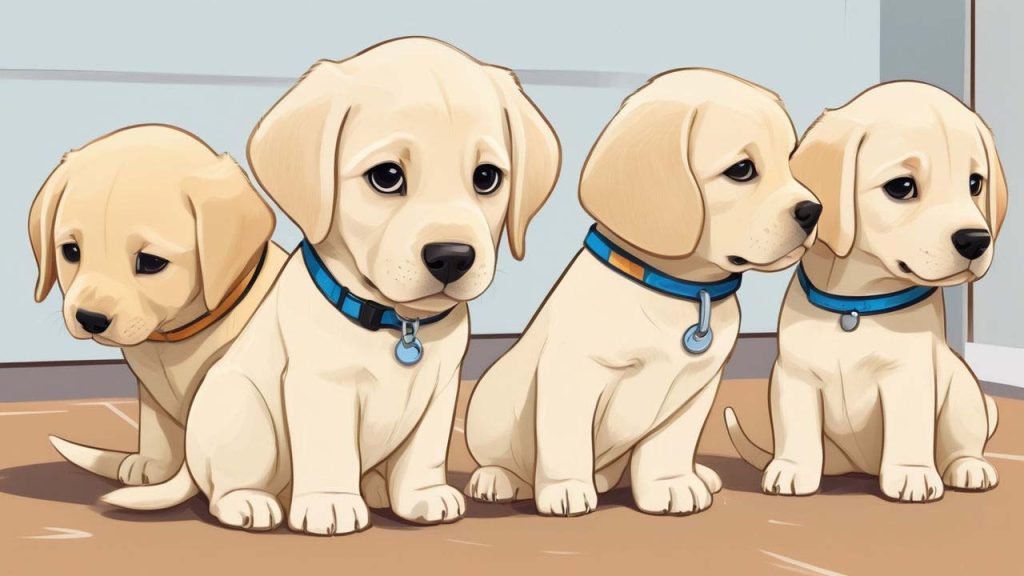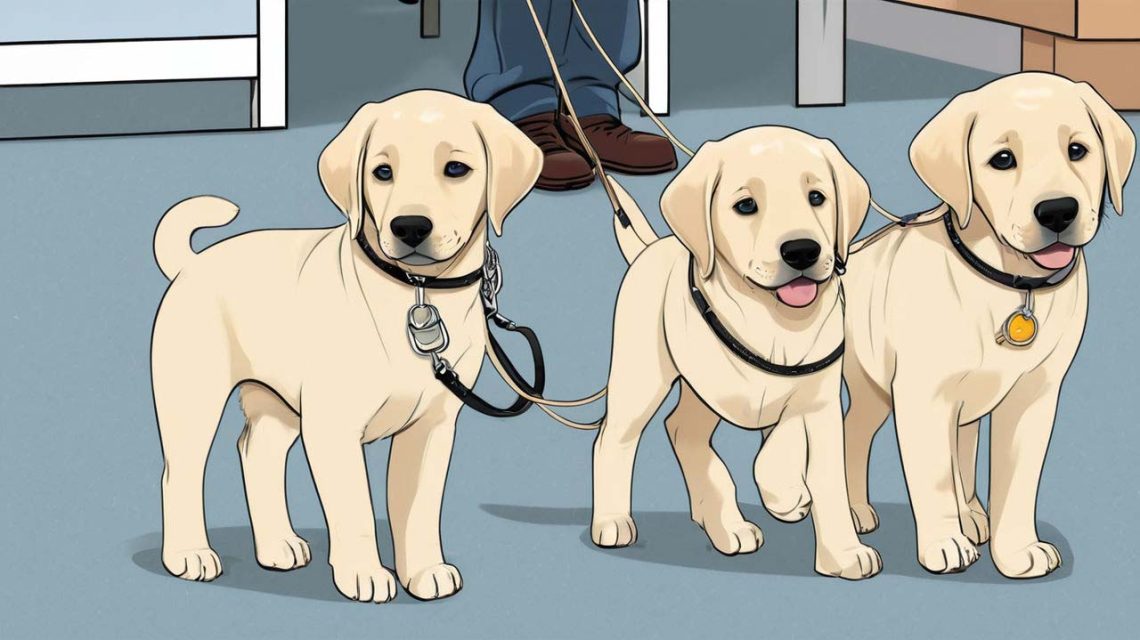Guide dog puppies begin a remarkable journey from birth to becoming a reliable companion for individuals with visual impairments. They aren’t just adorable and playful pups; they’re carefully selected, trained, and nurtured to develop the traits and skills necessary for this life-changing role. Here, we’ll explore what it takes for guide dog puppies to grow into capable guide dogs and how they make an incredible difference in people’s lives.
The Role of Guide Dog Puppies: Why Their Training Matters
Guide dog puppies have an important purpose beyond that of an average pet. They are born with the potential to become indispensable partners, helping individuals navigate the world safely and independently. Early training and socialization are essential to prepare them for their future responsibilities.
Building Independence for the Visually Impaired
Guide dog puppies are trained to understand and react to specific commands, obstacles, and potential hazards, giving their future handlers the freedom to move confidently. Their training goes beyond basic obedience, teaching them to navigate complex environments and respond intelligently to unexpected situations.
Companionship and Emotional Support
Guide dogs don’t only serve as navigators; they also provide companionship, loyalty, and emotional support. Many handlers form deep bonds with their guide dogs, finding comfort in their presence and dedication.
Selecting Ideal Breeds for Guide Dog Puppies
Not every puppy has the temperament or physical abilities to become a guide dog. Specific breeds are chosen based on their intelligence, temperament, and health, which are crucial for fulfilling the demanding role of a guide dog.
Popular Breeds for Guide Dog Training
Common breeds for guide dogs include Labradors, Golden Retrievers, and German Shepherds, as these breeds possess the right combination of loyalty, intelligence, and patience. Their natural eagerness to learn and bond with handlers makes them ideal guide dog puppies.
Key Traits for Successful Guide Dogs
Beyond breed, successful guide dog puppies are selected for traits such as calmness, focus, and resilience. These puppies must stay calm in crowded or noisy environments, remain focused on tasks, and have the ability to handle stressful situations without fear or distraction.

The Early Life and Socialization of Guide Dog Puppies
Early socialization plays a huge role in preparing guide dog puppies for the world. This foundational phase includes exposure to various environments, people, and experiences to develop confidence and adaptability.
The Role of Puppy Raisers
Puppy raisers are volunteers or foster families who take in guide dog puppies during their early months. These dedicated individuals expose the puppies to everyday experiences, like walking in parks, visiting stores, and meeting new people. This process prepares the puppies for the environments they’ll encounter as guide dogs.
Introducing Guide Dog Puppies to Various Environments
Guide dog puppies are introduced to various situations that involve sights, sounds, and textures, from navigating busy city streets to staying calm in a quiet library. Early exposure to these experiences helps puppies adapt to the wide range of environments they’ll encounter as adult guide dogs.
Training Phases for Guide Dog Puppies
Guide dog training is comprehensive and structured, with each phase building on the previous one. From basic obedience to specialized training, guide dog puppies undergo a journey that shapes them into life-changing companions.
Basic Obedience and Social Skills
In their early months, guide dog puppies learn fundamental commands like “sit,” “stay,” and “come.” These commands serve as the foundation for more complex tasks. At this stage, they also learn social manners, such as staying calm around other animals and people.
Specialized Skills Training
When guide dog puppies reach about one year of age, they move on to specialized training. This includes skills like navigating crosswalks, avoiding obstacles, and safely guiding their handler around hazards. Trainers focus on commands like “forward,” “halt,” and “left” to help puppies understand how to respond to their handler’s movements.
Intelligent Disobedience Training
One unique aspect of guide dog training is “intelligent disobedience,” where puppies learn to disobey a command if it would put their handler in danger. For example, if a handler gives a command to step forward but a car is approaching, the guide dog will ignore the command to keep their handler safe.
How Guide Dog Puppies Graduate to Become Guide Dogs
Graduating from training to working as a guide dog is a significant achievement. Only the most capable guide dog puppies meet the rigorous standards required to become full-fledged guide dogs.
Assessment and Certification
Before graduating, guide dog puppies undergo a series of assessments to ensure they can handle the responsibilities of guide work. They’re tested on everything from obedience and task completion to their response in stressful environments. Upon successful completion, they’re officially certified as guide dogs.
Matching Guide Dogs with Their Handlers
Each guide dog is carefully matched with a handler based on lifestyle, walking speed, and temperament. Trainers assess the compatibility of each pair to ensure a strong working relationship. Once matched, the guide dog and handler begin training together, building a partnership based on trust and understanding.
Daily Life with a Guide Dog Puppy
While guide dog puppies have demanding training schedules, they also experience plenty of love, playtime, and care. A balanced life helps them develop a positive attitude and resilience for their future roles.
Playtime and Bonding
Even as they train, guide dog puppies need time to relax and play. Play sessions with their puppy raisers or trainers build trust and allow them to enjoy regular puppy experiences. Playtime encourages a well-rounded personality, preventing stress and promoting mental well-being.
Maintaining Health and Nutrition
Proper nutrition is crucial for guide dog puppies. They require a diet that supports their energy needs and maintains a healthy weight for optimal mobility. Regular vet check-ups ensure they’re on track for physical and developmental milestones.
The Emotional Impact of Guide Dog Puppies on Handlers
Guide dogs play an incredible role in providing both emotional and physical support to individuals with visual impairments. Beyond guiding, they offer comfort, companionship, and a sense of independence.
Providing a Sense of Freedom
With a guide dog by their side, handlers experience a newfound freedom to explore, travel, and navigate the world with confidence. Guide dogs empower their handlers to participate in daily activities without relying heavily on others.
Forming a Strong, Lasting Bond
The bond between guide dogs and their handlers is unique and enduring. Guide dogs provide companionship, loyalty, and constant support, creating a relationship based on trust and mutual respect. This bond often enhances the handler’s quality of life, both emotionally and socially.
Frequently Asked Questions About Guide Dog Puppies
How long does it take for guide dog puppies to be fully trained?
- Guide dog training usually takes about two years. Puppies spend their first year with puppy raisers, followed by specialized training before they’re matched with a handler.
What breeds make the best guide dog puppies?
- Labradors, Golden Retrievers, and German Shepherds are popular breeds for guide dogs, as they’re known for their intelligence, loyalty, and calm demeanor.
Can guide dog puppies enjoy playtime and relaxation?
- Yes, playtime is important for guide dog puppies! It keeps them mentally and physically healthy, helping them develop a balanced temperament.
What is the role of a puppy raiser in training guide dog puppies?
- Puppy raisers volunteer to provide basic training, socialization, and exposure to various environments. They play a crucial role in preparing the puppies for formal training.


